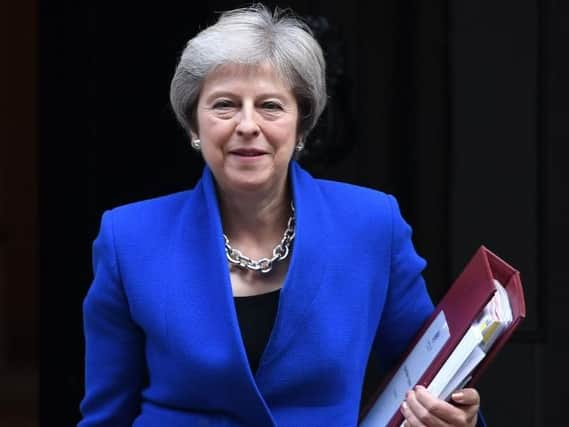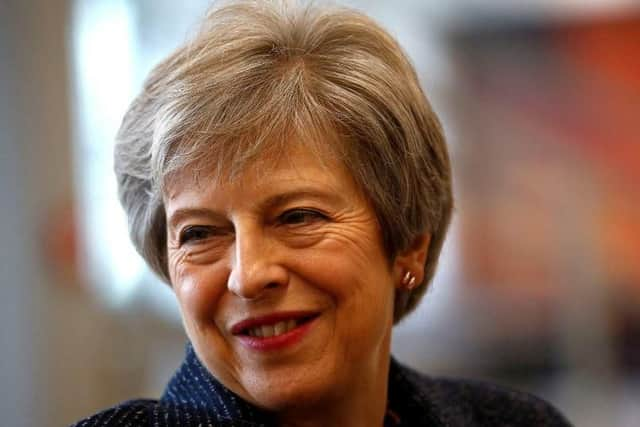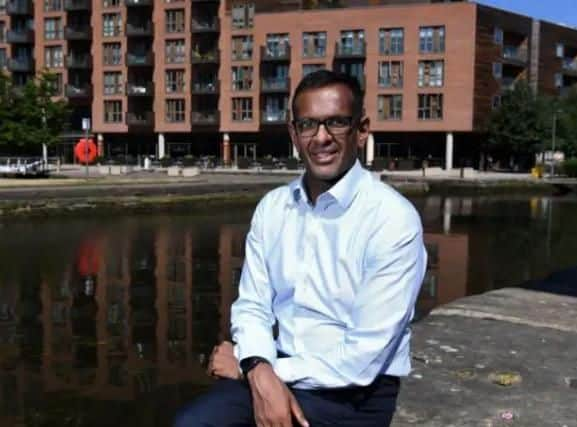Yorkshire Post readers asked Theresa May about her Brexit deal - this is how she responded


As Downing Street intensified its efforts to win over the public over the proposed Withdrawal Agreement, Post readers were invited to submit questions to the Prime Minister.
She said: “I’d like to thank the readers of The Yorkshire Post for sending me your questions on the Brexit deal and how it will affect the things that matter to you most. The people of Yorkshire voted to leave the EU and I truly believe the Brexit deal is the right one for you – taking back control of our money, borders and laws. But whichever way you voted, I believe now is the time for us all to come together as a country, as we look to the future.”
Advertisement
Hide AdAdvertisement
Hide AdQ: Phil Caplan, co-director of Scratching Shed Publishing and Forty20 magazine and bookshop owner in Leeds


As small, independent, family-owned businesses, we have two major reservations; one general, the other specific. Selling a fixed-price product, books, we are extremely mindful of the dire economic consequences forecast by the IMF that Brexit will entail, “a significant retail downturn”. As publishers, we have already seen two price increases on paper and print imports pre-Brexit which puts severe strain on our cost base and endeavours to keep our retail price stable. What guarantees can be given that business such as ours can survive the upheaval?
A: What’s been agreed is a business-friendly deal. It protects the vital integrated supply chains between the UK and EU, and will see the creation of a new free trade area for goods – with no quotas or fees for businesses trading with the EU. We have also agreed an implementation period, to give businesses like yours time to adapt to our new trading relationship with the EU, and reduce uncertainty. Outside of Brexit, the government is also investing £694.9m in the Leeds city region through our Local Growth Deals, and our Industrial Strategy is working with Yorkshire’s business community to find out how we make the region one of the most competitive places in the UK to run a company.
Q: Ian Smith, Bradford
Given that you intend to do everything possible to make a success of Brexit, then what action would you take in the event of parliament rejecting this Withdrawal Agreement deal, to ensure that the process of leaving the EU is successfully enacted?
Advertisement
Hide AdAdvertisement
Hide Ad

A: If the vote is rejected, then the government has 21 days to make a statement in Parliament on the next steps we’re going to take. But right now I’m focused on making the argument for the deal, because the people of the United Kingdom voted decisively to leave the European Union and we are leaving on March 29th 2019. It’s now up to MPs in Yorkshire and beyond to back this deal, as the best way of delivering on the historic referendum result and make our exit from the EU as smooth and orderly as possible.
Q: Dorothy Fairburn, Director North, Country Land and Business Association, North Yorkshire
Agricultural and rural enterprise in Yorkshire is a vital component of our wider economy but no funding commitments exist beyond 2022, despite the Government setting out an agricultural transition period through to 2027. What reassurances can she give farmers that there will be sufficient long-term funding to both safeguard and strengthen agriculture and the wider rural economy?
Advertisement
Hide AdAdvertisement
Hide AdA: Leaving the EU means we will scrap the Common Agricultural Policy – and having been tied to burdensome and outdated EU rules for nearly 50 years, we can deliver a green Brexit that truly works for farmers and the rural economy. The Agriculture Bill making its way through Parliament, will ensure long-term funding for farmers and land managers through a new Environmental Land Management System – and we’re working with farmers to design, develop and trial a new approach. Once passed, the Bill will allow us to reward farmers in Yorkshire and further afield who protect our environment for future generations.
Q: Paula Dillon, president of the Leeds Chamber of Commerce.
Will businesses be able to move skilled staff members between the UK and the EU in future?
A: After Brexit we’re going to put a new system in place that enables people to come to the UK on the basis of skill, not nationality. We will be setting out details of the UK’s future immigration system in due course, but it will include temporary arrangements for people travelling to and from the EU for business as well as visa free travel for short-term trips. And crucially it will mean that at long last it will be for the UK to decide what immigration system works best for our country.
Q: Ron Carbutt OBE, Cawthorne, South Yorkshire:
Advertisement
Hide AdAdvertisement
Hide AdHow will we be better off as a result of your withdrawal deal compared to our present position of staying in the EU?
A: People in Yorkshire were given the vote, and they voted to leave. It’s our job as politicians to respect that. We have now got a good deal. The economic analysis we’ve published shows it is the best deal for our economy that respects the referendum result. We would have a free trade area with the EU for goods, ambitious arrangements on services that are better than any other country has with the EU – and we would have the freedom to strike our own trade deals with other countries. Now MPs should back this deal as the best way of protecting our economy while delivering on the referendum. I believe that this country’s best days lie ahead of us.
Q: Professor Koen Lamberts, University of Sheffield President and Vice-Chancellor
Advertisement
Hide AdAdvertisement
Hide AdTo ensure the UK can build on the global reputation of its world-leading universities in the context of Brexit, will you seriously consider reviewing the recommendation of the All Party Parliamentary Group on International Students that international students should be removed from net migration targets and that an attractive post-study work visa system should be introduced?
A: International students will continue to play an important role in our university system, and there is no limit on the number of international students who can come to study in the UK. Britain continues to be the second most popular destination for international students, including to renowned universities like Sheffield, York and Leeds. We’re looking closely at that particular report on how the UK’s post-study work visas works, and I still want to ensure universities are a magnet for students from around the world.
Q: Andrew Beadnall, Beadnall Copley estate agents, Wetherby
How frustrated do you feel in that whatever your achievements have been away from Brexit negotiations since becoming Prime Minister over two years ago, the public do not see any of that and merely judge you purely on Brexit?
A: Thanks for the opportunity Andrew to let me talk about our record of delivery! Let me tell some of the things we have done– we’ve built more than 23,000 more affordable houses in Yorkshire, employment is up 198,000 since 2010 across the county, and we’ve driven up standards in our schools, with 171,000 more children at good or outstanding schools in Yorkshire than eight years ago. But Brexit is the biggest and most critical issue affecting our country right now. I think (The) Yorkshire Post readers want us to get on with it and deliver on the vote of the people so we can focus on other priorities. I think the deal we’ve agreed is the right one for Yorkshire and the UK.
Q: Laurie Armitt, via Facebook:
Advertisement
Hide AdAdvertisement
Hide AdHow do you prevent freedom of movement if there is no hard border on the island of Ireland?
There are unique arrangements in the form of the Common Travel Area, which allows British and Irish people to move and settle across the UK and Ireland. But otherwise, when non-British or non-Irish people come to the UK via Ireland after Brexit, they will be required to meet the UK’s immigration requirements under our new immigration system. UK authorities, working closely with their Irish counterparts as they do now, will continue to do all they can to make sure people who move to our country have a right to be here.
Analysis - Professor Anand Menon, director of The UK in a Changing Europe
Trade offs. That’s the notion central to what Theresa May is saying to the readers of The Yorkshire Post, but the phrase she remains stubbornly unwilling to use.
Advertisement
Hide AdAdvertisement
Hide AdThe deal she has negotiated is a subtle, complex – and, of course, profoundly unreadable – compromise. A compromise between her interpretation of what the referendum result was all about and a desire to continue cooperating as closely as possible with the EU. A tradeoff between ‘control’ and the economy.
Nowhere is this clearer than in her response to Ron Carbutt’s question about how we will be better off with her deal. ‘People in Yorkshire,’ replies the Prime Minister, ‘voted to leave.’ Allow me to translate: we won’t be better off than we are now with this deal. We will be worse off as a country.
Brexit, in essence, is a process of making trade with our largest and nearest trading partner more difficult. So, it will have a negative impact, because countries trade most with those nearest to them.
Advertisement
Hide AdAdvertisement
Hide AdOn the other hand, there’s more to life than money. If you want to end free movement, for instance, you may think a hit to the national economy is a price worth paying.
So the Prime Minister has responded to the various pressures upon her – from leave voters, from her own MPs, from businesses keen to keep trading with the EU and so on – and hatched a plan to split the difference between them.
A deal no one loves, but which gives everyone something. The calculation is simple: it is a way of leaving the EU while minimizing the economic harm.
And of course, there is plenty a government can do to improve the lives of its citizens even outside the EU. Mrs May’s deal will mean our economy will grow less quickly than it otherwise would have done, not that it will stop growing altogether. And its impact will be far less severe than that of the only other kind of Brexit on offer – no deal.
Advertisement
Hide AdAdvertisement
Hide AdWhich brings me, finally, to Andrew from Wetherby and his question about the achievements of the Government. The Prime Minister provides a brave stab at a positive response. But the truth is that, to all intents and purposes, government has been on hold while it has wrestled with Brexit.
The big question is, if and when we finally sign a deal and leave, will Mrs May use the full force of the governmental machinery at her disposal to address those profound and genuine discontents which led people to vote to leave in the first place?